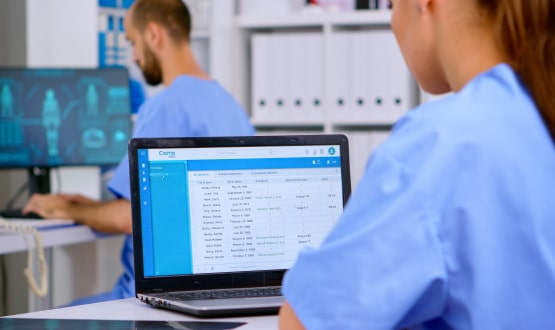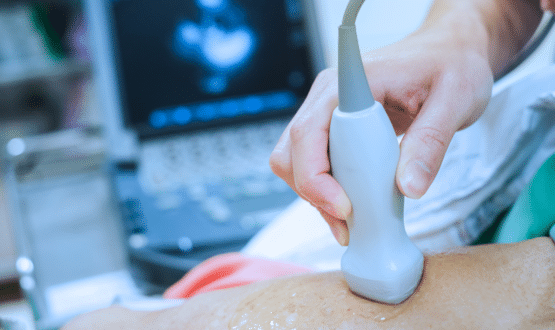Blackpool clinical staff benefit from GP data access
- 17 April 2019

Clinical staff in Blackpool have been given access to GP patient data in a bid to save time and improve care.
Blackpool Teaching Hospitals NHS Foundation Trust’s pharmacists, doctors and nurses now have real-time access to 300,000 patient records from 40 GP practices across the region via the Medical Interoperability Gateway (MIG).
The MIG, from Healthcare Gateway, helps to plug the gaps with important primary care information such as patient demographics, diagnosis, prescriptions, risk and warnings, presented as an integrated view within the host application.
Craig Tilley, lead pharmacist, Electronic Prescribing and Medicines Administration said: “Before the MIG, we had numerous challenges in accessing patient data, especially out of hours or at weekends. Within the first couple of months after going live, we were having around a thousand hits a month on the MIG.
“So, if you imagine a thousand phone calls to the GP, each taking around five minutes, that’s five thousand minutes back per month. The number of hours we’re saving for pharmacies, doctors and nurses is just huge.”
The MIG is a national interoperability solution, which enables the two-way exchange of patient information between local healthcare settings. It provides real-time patient information where it’s needed, when it’s needed. Uniquely, it can provide connectivity to every UK primary care system (EMIS, TPP, INPS and Microtest).
The software solution can also quickly extend its reach to many other systems to allow access to even more patient data.
Blackpool Teaching Hospitals are using the Lancashire Person Record Exchange Service (LPRES) to access records held in nearby locations.
Tilley added: “That will give us access to the MIGs not just in our locality but also south in Preston, to the east in Blackburn and Burnley, and the north in Morecambe Bay and Lancaster.
“We are already using the MIG to pull back the EPaCCS (Electronic Palliative Care Co-ordination Summary) from local practices and hopefully this will roll out across the region.
“My ideal future would have the MIG link up with the SCR (Summary Care Records) so that if patients were from out of the area and not covered by the MIG, the MIG interface would then pull back the data from the SCR and present this in a similar way.”
Other technologies being rolled out across the trust also include setting up video links between Clifton Hospital and Trinity Hospice to allow patients to access specialist care quickly.





10 Comments
I understand where Bertl is coming from. I do not want data about me from several different organisations to be held in one place. The NHS has demonstrated that it cannot resist the temptation to misuse, or use that data for purposes beyond which patients have consented to. The NHS makes up its own definition of words such as ‘consent’, ‘anonymous’, and the latest thing is expanding what is meant by ‘direct care’. The NHS cannot be trusted. The vast majority of patients are oblivious, or simply are not bothered, which is why the NHS gets away with what other organisations would be hauled over the coals for
I am perfectly happy for anyone to share anything they want or need to share in any way they want or need to share it. I simply do not want to be coerced into putting the medical story of my life (including some absolute nonsense that has been generated along the way) into an integrated record on a system controlled by people I have permanently lost the capacity to trust. In NHS speak, consent does not mean consent. I also know by now how the NHS proceeds by stealth. You consent to an inch and mysteriously the goal posts have moved and an inch has become a mile. Where I am coming from is profound and irreversible distrust of this government and this institution. I don’t know where @Bertl comes from – I never go anywhere near Twitter or whatever. Yuck!
Bertl, you’re taking a very top down view of this. But what are the views of the patients on how quickly they want their care taken care of. One of the biggest challenges to treating a patient is the fact that the history held in their cradle-to-grave record isn’t accessible. Systems that make this history (I would say data, but you seem to have an issue with this term in connection with patients) available to front-line clinicians can only be a good thing; especially where a patient has a complex condition, or set of conditions, that they get tired of re-explaining to every HCP they meet – it’s 2019, patients expect the NHS to know who they are and what the NHS has been doing with them. The consent model is already pretty darn solid, especially compared to other industries that are already experimenting with GDPR loop-holes to continue direct marketing you. You won’t agree with this Bertl because you seem pretty set in your ways on this. But, the industry is moving in the right direction on security and confidentiality. Maybe we need to do less knocking of people trying to do good work. Confidentiality is a number one priority, but the framework protecting this also needs to be an enabler for better care and not something that makes it impossible to improve the quality of life for patients up and down the country. I have watched too many times as over-zealous clinicians put up the IG Wall and stop patients benefiting from amazing services – and there be no reason for this from a DS&P perspective, and it stemming from half-understanding and fear of doing the wrong this. It has to stop as its adding to the pressures on the NHS.
I can’t quite understand where @Bertl comes from. Every post or article about sharing records seems to attract a quick, fairly negative response – which has me racking my brains thinking that there must be something I’m missing.
However, being quoted in the article and having helped get the MIG up and running at BTH, I can’t help but see the sharing of data as a massive positive for the patients. We always try and obtain patient consent to look at their GP data, and this is used as part of a range of sources to ensure that we have the fullest picture of the patients medication, allergy and further medical history. Where patients are unable to consent, due to an underlying condition or the status of the patient then we act in their best interest and access this information.
Having been using the MIG for over 4 years (the article is a little out of date), I must have asked for permission from hundreds of patients. Not one has refused and most have been surprised that we don’t have the information on tap and need to ask at all.
Maybe @Bertl can explain why they are so anti record sharing. I can understand angst against big data programmes like care.data, but to be against a 1-2-1 sharing to help ensure we give patients the best possible treatment apperas to be throwing the baby out with the bathwater.
Hi Bertl – there are two ways to look at this.
As a cancer patient, I expect and require that everyone involved in delivering my care has access to all the information that is relevant to keeping me alive without me having to answer the same annoying questions every time I interact with the NHS – I have consented to this and primary legislation enables this. The MIG is just a tool to support the delivery of this requirement.
The other way to look at this is that there is a conspiracy to wrest control of the longitudinal record from patients and to quote Voktaire out of context.
Joined up care needs joined up information flows to sustain patient safety.
Surely this statement is self evident to anyone with an interest in patient safety and the improvement of an NHS which kills more people through poor communication between clinicians than almost any other cause?
How else would you propose the NHS addresses this issue? Patient held records have their place but they don’t address the timely flow of diagnostic information between the agencies involved in delivering care. My own cancer care is spread across three NHS Trusts, two pathology services and two radiology services – with my GP acting as care coordinator. How can that be coordinated efficiently and effectively without interconnected and interoperable IT services?
PLEASE don’t tell me that I’m missing the point. My life depends on the delivery joined up care, this is very personal. For me this isn’t an intellectual theoretical debate about ethics or morality – this is about personal survival and trying to stop other patients receiving less than perfect care – as I have due to poor information flows impeded by a misinterpretation of data protection legislation.
I have yet to see an NHS “consent model” that does what it says on the tin. You might be able to object or “opt-out” but your objections/opt-out are always circumvented, ignored or unlawfully overridden. There is no such thing as a consent model in the NHS. “Consent”, in NHS terms, means that the patient is apparently given a choice, but only if they choose to consent. How many patients have actually been allowed to opt out of having their GP record “presented as an integrated view within the host application”? This is very different from consenting to a particular piece of relevant information being made accessible to a particular person or group of people who need it at a particular moment in time. The NHS chooses not to know the meaning of consent or of confidentiality. This is a policy of duplicity that removes control from the patient and destroys even the possibility of trust.
i take it you havent used the system in question. consent model at source as well as when accessing data so how is that taking control away from the patient?
I don’t think I have missed the whole point of the article, but possibly you have. The whole point of the article is to endorse the view that the DHSC/NHS want everyone to believe and confidently expect everyone to believe if it is endorsed often enough. This is the view that there is only one way to get the relevant information to where it is needed efficiently, and that is by taking all control out of the hands of patients and giving the NHS full control of the complete longitudinal integrated health records of every patient in England. As Will Smart said in a speech ha gave in London roughly a year ago, that should be “quite easy to pull off”. The trick is to get everyone to believe that there is no other way of doing things. and that the system that suits the agenda of the DHSC and NHS England and Co is all good, everyone is a winner. Personally, I think it is profoundly destructive, but the point of the article is to propagate the party line. “Les malheurs particuliers font le bien général, de sorte que plus il y a de malheurs particuliers, et plus tout est bien.”
You would rather spend 1 hour waiting in a call queue with the gp practice trying to get the patient drug history than actially treating the patient?
I think you missed the point of the whole article
This might save time but you don’t improve care by treating the patient as a collection of data to be processed. I would far rather do without this kind of care.
Comments are closed.